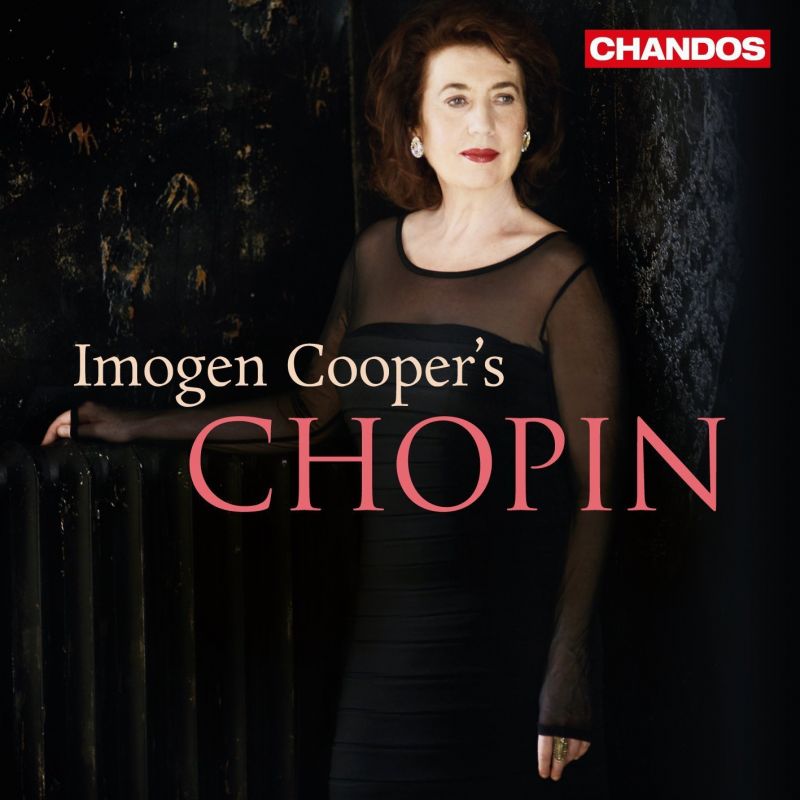Imogen Cooper’s Chopin
View record and artist detailsRecord and Artist Details
Composer or Director: Fryderyk Chopin
Genre:
Instrumental
Label: Chandos
Magazine Review Date: 07/2016
Media Format: CD or Download
Media Runtime: 80
Mastering:
DDD
Catalogue Number: CHAN10902

Tracks:
| Composition | Artist Credit |
|---|---|
| (16) Polonaises, Movement: No. 7 in A flat, Op. 61, 'Polonaise-fantaisie' |
Fryderyk Chopin, Composer
Fryderyk Chopin, Composer Imogen Cooper, Piano |
| Nocturnes, Movement: No. 17 in B, Op. 62/1 |
Fryderyk Chopin, Composer
Fryderyk Chopin, Composer Imogen Cooper, Piano |
| Nocturnes, Movement: No. 18 in E, Op. 62/2 |
Fryderyk Chopin, Composer
Fryderyk Chopin, Composer Imogen Cooper, Piano |
| Fantasie |
Fryderyk Chopin, Composer
Fryderyk Chopin, Composer Imogen Cooper, Piano |
| Ballade No. 4 |
Fryderyk Chopin, Composer
Fryderyk Chopin, Composer Imogen Cooper, Piano |
| Nocturnes, Movement: No. 8 in D flat, Op. 27/2 |
Fryderyk Chopin, Composer
Fryderyk Chopin, Composer Imogen Cooper, Piano |
| (4) Ballades, Movement: No. 1 in G minor, Op. 23 |
Fryderyk Chopin, Composer
Fryderyk Chopin, Composer Imogen Cooper, Piano |
| Nocturnes, Movement: No. 16 in E flat, Op. 55/2 |
Fryderyk Chopin, Composer
Fryderyk Chopin, Composer Imogen Cooper, Piano |
| Berceuse |
Fryderyk Chopin, Composer
Fryderyk Chopin, Composer Imogen Cooper, Piano |
Author: Jeremy Nicholas
It is a well-chosen and contrasted programme, opening, courageously enough, with one of the composer’s most elusive works, the late Polonaise-fantaisie. In the quieter lyrical passages she finds a rare poignancy that I find most affecting – and indeed it is this element that is a constant feature of Cooper’s playing. She has always been rightly lauded for her luminous, rich tone and it is deployed tellingly in Op 61 and the two late Nocturnes which follow (there are similar passages in the Ballade No 4 and the F minor Fantaisie). Then one begins to become aware that the colours have remained very much the same throughout these three pieces, and that leading voices in the right hand are projected in an almost aggressive manner. Try the D flat major Nocturne, compare it with Lipatti or Rubinstein inter alios and you’ll see what I mean.
The programme has been meticulously prepared, of course, but one is left with the feeling that it has all been so premeditated that there has been no room for anything surprising or spontaneous to happen in the studio (the concert hall at Snape Maltings, Aldeburgh). Curiously, the pp notes an octave above the stave in Op 61 sound rounded and expressive, while at the opposite end of the recital, the same register at the end of the Berceuse sounds disembodied and slightly out of tune.
Cooper in a revealing apologia in the booklet wonders if she has succeeded in conveying what has taken ‘many years to articulate’. No matter, she seems to say, for ‘the journey has been, and continues to be, moving and wonderful’. Such thoughtful and deeply felt interpretations of these works are always welcome but I feel that, ultimately, Cooper’s Chopin is work-in-progress.
Discover the world's largest classical music catalogue with Presto Music.

Gramophone Digital Club
- Digital Edition
- Digital Archive
- Reviews Database
- Full website access
From £8.75 / month
Subscribe
Gramophone Full Club
- Print Edition
- Digital Edition
- Digital Archive
- Reviews Database
- Full website access
From £11.00 / month
Subscribe
If you are a library, university or other organisation that would be interested in an institutional subscription to Gramophone please click here for further information.




